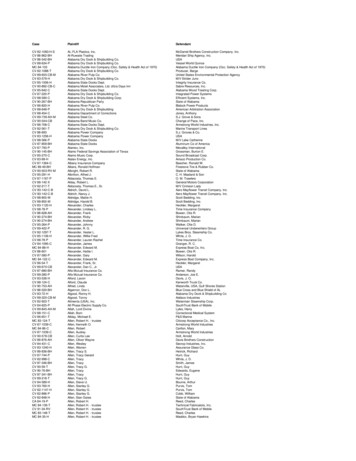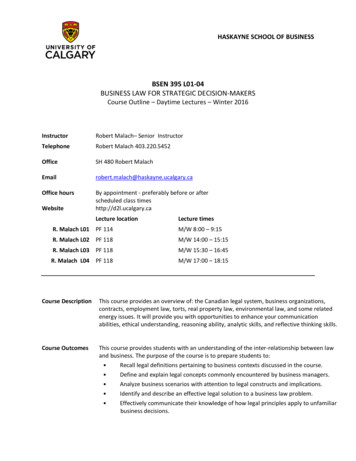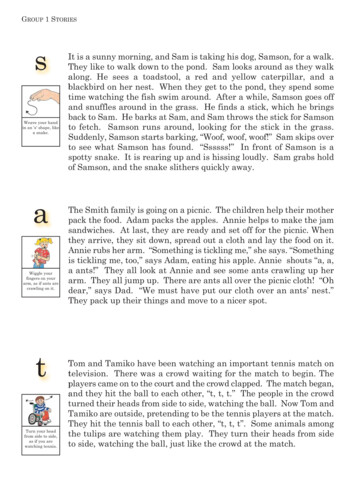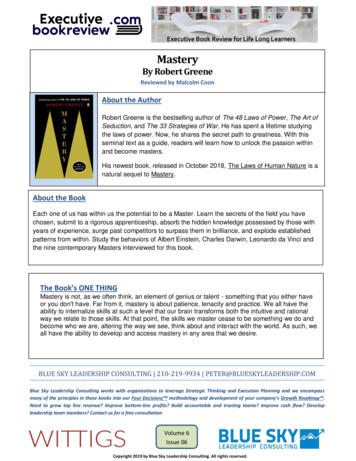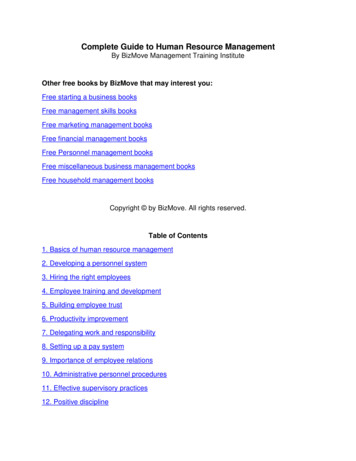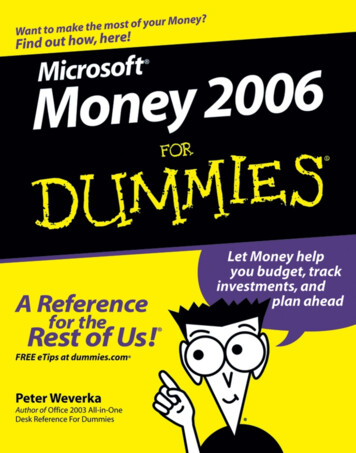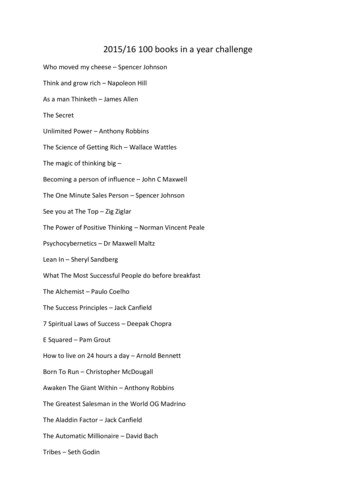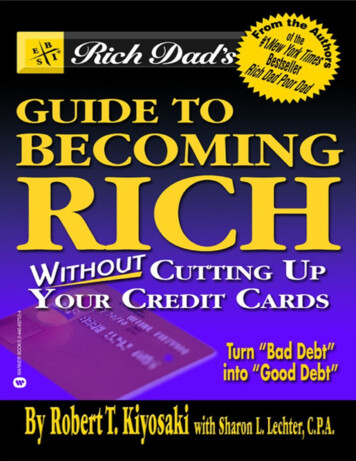
Transcription
Other Bestselling Books by Robert T. Kiyosaki & Sharon L. LechterRich Dad Poor DadWhat the Rich Teach Their Kids About Money That the Poor and Middle Class Do NotRich Dad’s CASHFLOW QuadrantRich Dad’s Guide to Financial FreedomRich Dad’s Guide to InvestingWhat the Rich Invest In That the Poor and Middle Class Do NotRich Dad’s Rich Kid Smart KidGive Your Child a Financial Head StartRich Dad’s Retire Young Retire RichHow to Get Rich Quickly and Stay Rich ForeverRich Dad’s ProphecyWhy the Biggest Stock Market Crash in History Is Still Coming And How You Can Prepare Yourself and Profit from It!Rich Dad’s Success StoriesReal Life Success Stories from Real Life People Who Followed the Rich Dad LessonRich Dad’s Guide to Becoming Rich Without Cutting Up Your CreditCardsTurn “Bad Debt” into “Good Debt”2
CopyrightThis publication is designed to provide competent and reliable informationregarding the subject matter covered. However, it is sold with theunderstanding that the author and publisher are not engaged in rendering legal,financial, or other professional advice. Laws and practices often vary fromstate to state and if legal or other expert assistance is required, the services ofa professional should be sought. The authors and publisher specificallydisclaim any liability that is incurred from the use or application of thecontents of this book.Although based on a true story, certain events in the book have beenfictionalized for educational content and impact.CASHFLOW and Rich Dad are registered trademarks of CASHFLOWTechnologies, Inc. Rich Dad’s Advisors is a trademark of CASHFLOWTechnologies, Inc.are trademarks ofCASHFLOW Technologies, Inc.Copyright 2003 by Robert T. Kiyosaki and Sharon L. Lechter.All rights reserved. Except as permitted under the U.S. Copyright Act of 1976,no part of this publication may be reproduced, distributed, or transmitted inany form or by any means, or stored in a database or retrieval system, withoutthe prior written permission of the publisher.Warner Business BooksHachette Book Group237 Park AvenueNew York, NY 100173
Visit our website at www.HachetteBookGroup.comWarner Business Books is an imprint of Warner BooksFirst eBook Edition: January 2010ISBN: 978-0-7595-2145-24
ContentsOther Bestselling Books by Robert T. Kiyosaki & Sharon L. LechterCopyrightIntroductionChapter One: What Is the Price of Being Cheap?Chapter Two: What Is the Price of a Mistake?Chapter Three: What Is the Price of Education?Chapter Four: What Is the Price of Cutting Up Your Credit Cards?Chapter Five: How Much Debt Do You Really Have?Chapter Six: What Is the Price of Change?In Conclusion What Is the Price of Fixing Your Financial Report Card?AppendixRobert KiyosakiSharon Lechter5
IntroductionThe question really is:WHO DOESN’T WANT TO BE A MILLIONAIRE?Recently, the most popular show on American television was Who Wants toBe a Millionaire. It was an overnight success not only here, but worldwide,with different on-air hosts in different countries. All you had to do, of course,was answer a series of trivia questions, and with each correct response, youearned more cash—right up to the jackpot of one million dollars!The question “Who wants to be a millionaire?” became a popular catchphrase everywhere. Let’s face it—with so much fixation on shows aboutmoney, getting rich, stock market millionaires, and huge lottery payouts, itleads us to the question, “Who doesn’t want to be a millionaire?”And yes, it is possible to win a million dollars on a game show. It is alsopossible to get millions of dollars by winning the lottery. And it is possible tobecome a millionaire by investing in an IPO (initial public offering). Then youcould retire rich for the rest of your life. In fact, there are more ways tobecome rich today than in any other time in our history. Maybe that is whythere is such an international frenzy over the idea of getting rich—and thequicker the better.I was recently on television talking about my book Rich Dad Poor Dad. Theinterviewer asked, “Come on, why don’t you tell us the truth? Didn’t you writeyour book simply to take advantage of this get-rich-quick craze that issweeping the nation?”Her question really surprised me and I was almost at a loss for words.Finally, after regaining my thoughts, I replied, “You know, I never saw it thatway. I can see why you would think I would write a book just for that reason. Iwish I could say I was that smart. Smart enough to time my book for just thismoment in history, but I am afraid I am not that smart. I wrote this bookbecause I wanted to tell the story of the money lessons I learned from my twodads.”6
When I wrote the book in 1997, every bookstore and book distributor weapproached turned it down. For that matter, in 1997, Who Wants to Be aMillionaire was not yet a TV show. I paused and said, “In fact, my bookactually represents the exact opposite message of these game shows, stockmarket millionaires, and lotteries.” Again I paused, thinking for a moment, andthen continued, “There is indeed a frenzy today about getting rich quick andwhile my book is about getting rich, it is not about getting rich quick.”The commentator nodded and grinned a skeptical grin. “So if you are notpart of this get-rich-quick mania, then what are you? Get rich slowly?”I could feel her sarcasm and it challenged me. In front of millions of viewersI had to try to keep my cool. So I forced a chuckle in response to her barbedcomment and said, “No, my book is not about getting rich quickly or gettingrich slowly” I then smiled and waited for her to ask me the next question. Thesilence was deadly but I held my ground as calmly as possible, waiting for herto make the next move.She smiled and asked, “So what is your book about?”I grinned and replied, “It is about the price of getting rich.”“The price?” she replied. “What do you mean by the price?”As she asked the question, the producer signaled to her that we were out oftime. She then urged me to hurry with my answer and I ended the interview bysaying, “Most everyone wants to get rich. But the problem is, only a fewpeople are willing to pay the price.”The TV interview was over. The host thanked me and they cut to the finalcommercial. The problem was, I never answered what I think the price ofbecoming a millionaire is. This book answers the question that was notanswered on that television interviewWho Pays the Price?The U.S. Department of Health, Education, and Welfare tracked people fromage twenty to sixty-five. Their findings were as follows:By age sixty-five, per 100 people:145was wealthywere well offwere still working because they had to7
5436were living on family or government supportwere deadIn addition, more than 35 percent of that wealthy 1 percent inherited theirwealth, as did a large percentage of the 4 percent that were well off. As anadditional note, Forbes magazine defines the rich as individuals with anincome of over 1 million a year.With the economic boom of the last ten years of the twentieth century, therewas an increase in the number of wealthy and well off. Yet, the questionremains, what did the top 5 percent who are rich do that the others did not?What was the difference in price the 5 percent paid that the others did not pay?Does a Big House Mean You’re Rich?When I was young, my rich dad drove me past a classmate’s house, located ina very rich neighborhood. I asked rich dad if my classmate’s dad was rich.Rich dad chuckled and responded, “A high-income job, a big house, nice cars,and lavish vacations do not mean you’re rich. In fact it could mean exactly theopposite. A lavish lifestyle does not mean you’re smart or well educated. Itcould mean exactly the opposite.”Most of us are wise enough to understand what rich dad meant by thatstatement. Yet, I think one of the reasons so many people faithfully play thelottery is because they too would like to have a nice big house, expensive cars,and all the other toys that money can buy. While it is possible to gain millionsby winning the lottery, in reality, the chances are extremely slim. Just as a bighouse does not necessarily mean you’re rich, sitting around watching a gameshow, or betting on your lucky numbers, is not the price that most of the top 1percent paid to become rich.What Is the Price of Becoming a Millionaire?There are many different ways to become rich. Winning the lottery or winningon a game show are just two examples. You can also become rich by beingcheap, becoming a crook, or even marrying a millionaire. Many peopleactively look for millionaires to marry. Of course, be forewarned: With any8
method of attaining great wealth, there is a price, and the price is not alwaysmeasured in money.The price for sitting around and watching game shows and betting on thelottery is that the vast majority of the viewers will never become rich andthat is a very steep price to pay. There are better ways to become rich, withmuch better odds, but most people are not willing to pay the price. In fact,there are some ways of becoming rich in which the odds are in the person’sfavor, almost guaranteeing that a person will become rich, but again theproblem is that most people are not willing to pay the price. And that is why,according to the Department of Health, Education, and Welfare, only 1 out of100 people actually become rich, in the richest country in the world. Theywant to be millionaires, but they are not willing to pay the price.So what did my rich dad mean by the price? Using a different example toexplain the concept of price best explains this idea. What if I said, “I wish Ihad a body like Arnold Schwarzenegger.” Well, the first thing most of youwould say to me is, “Put on your running shoes, do five miles a day, go to thegym for three hours a day, and stop stuffing your face with pizza.” To which Iwould say, “Is there another way to have a body like Arnold’s?” That is what Imean by the price. Millions of people would like to have a great body but fewpeople are willing to pay the price. And that is why ads that promise, “Youwill lose weight and still be able to eat all you want. Just take this little magicpill,” or, “You can look like this gorgeous model without exercise or dieting,”make so much money. Regardless if it’s money, a sexy body, greatrelationships, happiness, or whatever we as humans have a desire for,Madison Avenue will come up with an ad campaign that promises the quickand easy way to get what you want. However, most of the products the adspromote do not work, not because of the products, but because the people whobuy them are not willing to do the work (or pay the price).I often refer to the 385 real estate investment course I purchased from atelevision infomercial many years ago. I remember sitting at home surfing thechannels when I came across this infomercial. The ad encouraged me to cometo a free evening seminar at the Hilton Hawaiian Village, a hotel on the beachat Waikiki right next to the condominium where I lived. I called to make myreservation for the free seminar; attended the free seminar; and then signed upfor the 385 weekend seminar. I was still in the Marine Corps at that time, so Iinvited a fellow Marine pilot to go with me to the weekend seminar. He hatedthe seminar, called it a complete rip-off, a waste of time, and asked for his9
money back. Back at the squadron he said to me, “I knew it was going to be arip-off. I should never have listened to you.”My experience was completely different. I left the seminar, took the booksand tapes, read and listened to them, and have made millions of dollars fromthe information I learned from that seminar. As a friend of mine said to me anumber of years later, “The problem with your friend was that he was toosmart and did not get anything from the course. You were stupid enough tobelieve the instructor and went out and did what he taught you.”Today, I continue to recommend that people sign up for seminars to learn thebasics of buying real estate, starting a business, investing in stocks, orwhatever. I often hear back from the audience, “But what if the course is nogood. What if I get ripped off? What if I don’t learn anything? Besides, I don’twant to fix toilets or have midnight phone calls from tenants.” When I hearsuch comments, I usually reply, “Then it is best you do not attend the seminar.The seminar will definitely be a rip-off.”In my experience, many people are looking for the answers that will maketheir lives better in some way. The problem is, when they find the answer theydon’t like it just as I don’t like the answer, “Stop stuffing your face withpizza and start pumping iron for three hours day.” In other words, until I likethe answer I’m getting, I don’t have a prayer of developing a body like ArnoldSchwarzenegger. The reason most people will never become rich is simplybecause they don’t like the answers they are getting. And in my opinion, it haslittle to do with the answer; it is the price that is attached to the answer that theperson really does not like. As rich dad said, “Most people want to get rich.They just don’t want to pay the price.”Now, in this book, I discuss the price of becoming rich without being cheap,immoral, crooked, or needing to marry a rich person. You will learn how to berich and still enjoy a very rich lifestyle. But there is a price and as my richdad often said to me, “The price of something is not always measured inmoney” I share the answers and the price I paid. If you don’t like my answersor my rich dad’s answers, remember there is more than one way to becomerich there will always be a new lottery and game show that asks he question,“Who Wants to Be a Millionaire?”10
Chapter 1What Is the Price of Being Cheap?“The price of something is not always measured in money.”—R DICHADThere are many books that popularize the idea of frugality and living belowyour means. Many so-called money experts write, speak, or broadcast on radioand TV the virtues of cutting up your credit cards, saving money, putting themaximum amount into your retirement plan, driving a used car, living in asmaller house, clipping coupons, shopping at sales, eating at home, passingused clothes from older kids down to the younger kids, taking cheapervacations, and other such tips.While these are excellent ideas for most people, and while there is a timeand place for frugality, most people do not like these ideas. The truth for mostpeople is that they love to enjoy the finer things of life that money can buy. Formost people, a big home, a new car, fun toys, and expensive vacations aremuch more fun and desirable than putting money away in a bank. Most of ustend to agree with the wise sages professing frugality and economicabstinence. Yet, deep down, many of us would rather have a platinum creditcard without a spending limit that is paid for by your rich uncle who hasmore money than all the Arab oil sheiks, private Swiss banks, and Bill Gatescombined.While most of us enjoy the wonderful things money can buy, we realize thatit is the unbridled desire for the fun, fine, and fancy things of life that gets manyof us in financial trouble. And it is the financial trouble that these desiresspawn that causes the money gurus to say, “Cut up your credit cards. Livebelow your means. Buy a used car.”On the other hand, my rich dad never said to me, “Cut up your credit cards.”He never said, “Live below your means.” Why would he advise me to dothings he personally did not believe in? When it came to the idea of frugality,11
he did say, “You can become rich by being cheap. But the problem is, eventhough you’re rich, you’re still cheap.” He would further say, “It makes nosense to me to live cheap and die rich. Why would anyone want to live cheap,die rich, and then have the kids spend your life’s savings after the funeral?”Rich dad noticed that people who scrimped and saved all their lives often hadchildren who acted like starving hyenas once the parents were gone. Instead ofenjoying their parents’ inheritance, they often fought over the money and spentit all soon after they got their hands on what they called their “fair share.”Instead of telling me to live cheaply, rich dad often said, “If you wantsomething, find out the price, then pay the price.” He also went on to say, “Butalways remember, everything has a price. And the price for becoming rich bybeing cheap is that you’re still cheap.”The Different Ways You Can Become RichRich dad went on to explain, “You can become rich by marrying someone forhis or her money. But we all know the price of that. I had a classmate in NewYork who often said, ‘It is just as easy to marry a rich girl as a poor girl.’When he graduated, he married into a very rich family just as he said he would.I personally think he was a slimeball, but that was his way of becoming rich.”You can become rich by becoming a crook, and we all know the price of thatchoice. When I was a kid, I thought a crook wore a mask and robbed banks.Today, I realize that there are many crooks that wear blue suits, white shirts,red ties, and who are often respected members of their community.There are others who become rich by betting at the casino or racetrack, onthe lottery, or blindly throwing their money into the stock market. We know theprice of that. During the dot-com mania, I knew many people who were readyto write a check if all you said was, “I’m starting an Internet company”You can become rich by being a bully and we all know what happens to abully. Eventually, an even bigger bully comes along, or the bully finds that theonly people willing to do business with him or her are people who enjoy beingpushed around.And as described earlier, you can become rich by being cheap and we allknow that the world tends to despise rich people who are cheap people likeScrooge in Charles Dickens’s classic A Christmas Carol. Most of us have metpeople who always want a larger discount, complain about the bill, or evenworse, refuse to pay the bill for one frivolous reason or another. A friend who12
owns a dress shop often complains about the type of customer who buys adress, wears it to a party, and then returns it a few days later, asking for hermoney back. And of course, there are those who drive old cars, wear clothestoo long, buy cheap shoes, and look poor and yet have millions of dollars inthe bank. While these individuals can become rich with such cheapness, thereis a price far beyond money for such behavior. I personally struggle with beingtoo cheap at times, and yet I notice that people tend to smile more or like memore when I am generous. For example, when I tip a little extra for goodservice, it comes back to me in other ways. In other words. people tend to likegenerous people more than cheap people.Can Everyone Be Rich?Rich dad and I talked further about the price of being rich. He told me, “Theprice is different for different people.”Rich dad also said, “The only people who think life should be easy are lazypeople.”Not being satisfied, I pressed on with my questioning. What did he mean bythe price is different for different people. His reply was, “I would like to thinkthat we all come into this world with unique gifts and talents gifts and talentssuch as singing, painting, athletics, writing, parenting, preaching, teaching, andso on. But just because God gave us these talents, it is still up to each of us todevelop those talents and developing those talents is often the price. Theworld is filled with smart, talented, and gifted people who are not what wewould call successful financially, professionally, or in their personalrelationships. While each of us has gifts, each of us has personal challenges toovercome. No one is perfect. Each of us has gifts and challenges, strengths andweaknesses. That is why I say, the price is different for different peoplebecause each of us has different challenges. The only people who think lifeshould be easy are lazy people.”I do not know if rich dad’s statement about lazy people is true or not. I doknow that his statement has been useful for me, whenever I found myselfcomplaining about things not being easy, or things not going my way. When Ifind myself saying, “I wish things were easier,” I know I am getting lazy. Sowhenever I find myself wishing things would be easier, I take a break, checkmy attitude, and ask myself about the long-term price of having that attitude. It’snot that I don’t look for an easier way to do things. I am simply aware of when13
I tend to be lazy, cheap, or when I act like a spoiled brat, and then I ask myselfwhat the price might be for that behavior.Money Is the Reward for Paying the PriceRich dad would also say, “Ask anyone who is rich, famous, or successful, andI am sure they will tell you that they had and have personal challenges anddemons to face every day along the way. Son, there is no free lunch. Mychallenge was that 1 had no education and no money when I started out. I alsohad a family to feed when my father died. I was thirteen years old when I wasgiven that challenge and there were even greater challenges to come. Yet, Imanaged to pay the price, and in the end, I achieved great wealth. In hindsight,money was my reward for paying the price.”The Price of SecurityOver the years, rich dad made sure his son, Mike, and I were always aware ofthe price of something. When my dad, the man I call my poor dad, advised meto “Find a safe secure job,” rich dad’s reply was, “Remember, there is a pricefor security” When I asked him what the price was, he answered, “For mostpeople, the price of security is personal freedom. And without freedom, manypeople spend their lives working for money, rather than living out their dreams.To me, to live life without achieving my dreams is much too high a price to payfor security.” He also made his usual comment on taxes, by saying, “Peoplewho seek security over freedom pay more in taxes. That is why people whohave safe, secure jobs pay more in taxes than people who own the business thatprovides the jobs.”I spent a few days thinking about that comment, letting the magnitude of theidea sink in. The next time I saw rich dad, I asked him, “Do I have to choosebetween security or freedom? In other words, does that mean I can have onebut not the other?”Rich (lad laughed after he realized how much thought I had given to hisremark. “No,” he replied, still chuckling. “You don’t have to have one or theother. You can have both.”“You mean I can have both security and freedom?” I asked.“Sure,” he said. “I have both.”14
“So why, by did you say that for most people, the price of security ispersonal freedom?” I asked. “How can you have both when you say mostpeople can have only one. What’s the difference?”“The price,” said rich dad. “I’ve always said to you that everything has aprice. Most people are willing to pay the price for security, but they are notwilling to pay the price for freedom. That is why most people have only one ofthe two. They only have one or the other.”“And why do you have both security and freedom?” Mike asked. He had justentered the room and had heard only part of the conversation.“Because I paid twice the price,” said rich dad. “I was willing to pay theprice for both security and freedom. It’s no different than having two cars.Let’s say I need a truck but I also want a sports car. If I want both, I pay twicethe price. Most people go through life paying for one or the other, but notboth.”“We pay a price even if we don’t pay the price,” rich dad continued.“So there is a price for security and there is a price for freedom. And youpaid the price for both.” I repeated what rich dad had just said, so I could letthe idea sink into my head.Rich dad nodded his head. “Yes, but let me add one more point of clarityabout my being willing to pay the price to have both. You see we all pay aprice anyway. We pay a price even if we don’t pay the price.”“What?” I replied, frowning and shaking my head. Rich dad now seemed tobe speaking in circles.“Let me explain,” said rich dad, gesturing with his hands that we shouldcalm down. “Do you remember when I helped the two of you with your sciencehomework a few weeks ago? You were studying Newton’s laws?”Mike and I nodded.“Do you remember the law of for every action there is an equal andopposite reaction?”Again we nodded. “That is how a jet flies through the air,” said Mike. “Theengine propels hot air backward and the jet moves forward.”“That’s right,” said rich dad. “Since Newton’s laws are universal laws, theyapply to everything, not only jet engines.” Rich dad looked at the two of us tosee if we were following what he had just said. “Everything.” He againrepeated just to make sure we understood.“Okay, everything,” said Mike, a little frustrated at the repetition.Suspecting that we were not really getting his point about everything, rich15
dad continued, “By everything I mean everything,” he continued on. “Do yourecall my lessons about financial statements? Do you remember my explainingthat for there to be an expense, there must be income somewhere else?”Now I was beginning to understand what he meant by “everything.”Newton’s universal laws also applied to financial statements. “So for everyasset, there has to be a liability” I added just to let him know that I wasbeginning to follow his thinking: A universal law applies to everything.”“And for something to be up, something else must be down,” added Mike.And for something to be old, something else has to be new. As Einstein said,‘It’s all relative.’”“Correct,” rich dad said with a smile.“So how does this apply to security and freedom and your being willing topay twice the price?” asked Mike.“Good question,” said rich dad. “It’s important because if you don’t paytwice the price, you never get what you want anyway. In other words, if youdon’t pay twice the price, you do not get what you paid for in the first place.”“What?” I replied. “If you don’t pay twice you don’t get what you paid for?”Rich dad nodded his head and began to explain. “People who pay the priceonly for security may never really feel secure like in job security,” he statedboldly. “A person may have a false sense of security, but they never really feelsecure.”“So even though my dad has what he thinks is a safe, secure job, deep downhe never really feels secure?” I asked.“That’s correct,” said rich dad. “Because he is paying only for the action butnot his internal reaction. The harder he works for security, or pays the price forsecurity, the more his insecurity grows inside him.”“Does it have to be insecurity as the reaction?” Mike asked.“Good question,” rich dad commented. “No, it could be something else thatis reacting. A person could have so much security that the reaction is boredomand then restlessness. They want to move on, but they don’t move on becausethen they would give up their security. So that is why I say each of us hasdifferent challenges, each of us is unique. We’re unique because we don’t reactto things in the same ways that others do.”“Like some people see a snake and panic, and others see a snake and gethappy,” I added.“That s correct. We are all different because we are all wired differently,”rich dad added.16
“So what is the point of all this mental gymnastics?” I asked.“The gymnastics are to make you think,” said rich dad. “I always want youto remember that everything has a price and that the price is often twice asmuch as it seems. If you pay for only one side of Newton’s law, you may thinkyou have paid the price but you may not get what you want.”“Can you give us some examples?” I asked.“I can give you general ones because, as I said, each of us is unique,” saidrich dad. “But as a general rule, always remember there are two sides to eachsituation.“For instance, the best employer has usually started his or her career as anemployee. He or she uses that prior experience as an employee to develop amanagement style that empowers the employees he or she manages.”“So a good employer will be honest and treat his or her employees how heor she would like to be treated?” I asked.“Exactly” Rich dad nodded. “Now let’s look at an extreme example. Whatdo you think it takes to be a good detective?”“To be a good detective?” Mike and I repeated in tandem, thinking that richdad was now driving down the wrong side of the road.“Yes, a good detective,” rich dad continued. “To be a good detective, adetective must first be honest, moral, and of the highest integrity. Is thatcorrect?”“I would hope so,” said Mike.“But to be good, a detective must also think exactly like a crook, or someonewho is immoral, unlawful, and unethical,” said rich dad. “Always rememberNewton’s law. You cannot be a good detective without also being able to thinklike a good crook.”Mike and I were now nodding. We were finally beginning to understandwhere rich dad was going with this whole lesson. “So that is why a personwho tries to become rich by being cheap still winds up, in many ways, as pooras someone who has no money?”Rich dad continued, “And why someone who seeks only security neverreally feels secure. Or someone who seeks low-risk investments never feelsinvesting is safe, and someone who is always right eventually winds up wrong.They pay the price for one side of the equation but fail to pay the full price.They violate a universal law”Mike chimed in, “That is why it takes two people to have a fight. And to bea good detective you have to also be a good crook. To lower risk, you have to17
take risks. To be rich you have to know what it is like to be poor. To knowwhat a good investment is, you have to also know what a bad one is.”“And that is why most people say investing is risky,” I added. “Most peoplethink that to invest in a safe investment you must also lower your return on theinvestment. That is why so many people put money in a savings account. Theyput it in for security and are willing to take less interest for that safety. But thefact is, th
Other Bestselling Books by Robert T. Kiyosaki & Sharon L. Lechter Rich Dad Poor Dad What the Rich Teach Their Kids About Money That the Poor and Middle Class Do Not Rich Dad’s CASHFLOW Quadrant Rich Dad’s Guide to Financial Freedom Rich Dad’s Guide to Investing What
